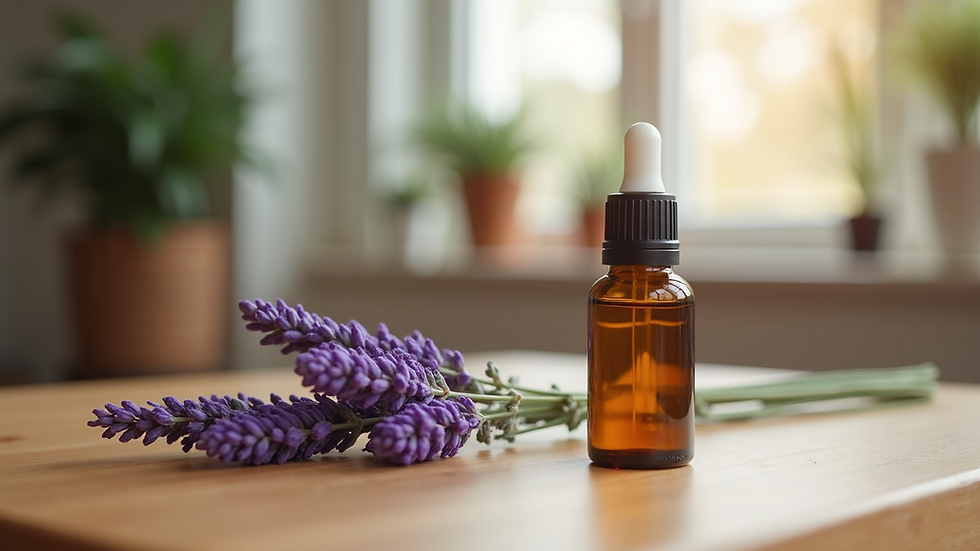Essential Oils: Benefits and Uses for Everyday Life
- Jul 22, 2025
- 4 min read
Essential oils have become increasingly popular as natural remedies for a variety of health and wellness issues. From promoting relaxation to boosting energy levels, these concentrated plant extracts offer remarkable therapeutic oil benefits. This blog post will explore the various benefits and uses of essential oils in everyday life, providing practical information and actionable recommendations for incorporating them into your routine.
Therapeutic Oil Benefits
One of the primary reasons people turn to essential oils is for their numerous therapeutic benefits. They are celebrated for their ability to promote physical, emotional, and mental well-being. Many essential oils possess anti-inflammatory, antimicrobial, and antioxidant properties, making them versatile tools in holistic health.
For example, lavender essential oil is well-known for its calming effects. A study published in the Journal of the Medical Association found that inhaling lavender oil can significantly reduce anxiety levels and improve sleep quality. Similarly, peppermint oil is recognized for its invigorating scent that can enhance focus and mental clarity.

In addition to aiding mental health, essential oils can support physical wellness. Tea tree oil has powerful antimicrobial properties and can be used topically to help reduce acne and other skin conditions. Eucalyptus oil is also beneficial for respiratory health, providing relief from congestion and sinus issues when inhaled.
How to Use Essential Oils Safely
While essential oils offer many health benefits, it is crucial to use them safely. These oils are highly concentrated and must be used with caution to avoid adverse reactions. Here are some essential guidelines for safe use:
Dilution: Always dilute essential oils with a carrier oil, such as coconut or jojoba oil, before applying them to the skin. A ratio of 1-2 drops of essential oil to a teaspoon of carrier oil is typically recommended for adults.
Patch Test: Conduct a patch test before applying a new oil to a larger area of skin. Apply a small diluted amount to your wrist or inner elbow and wait 24 hours to check for any reactions.
Quality Matters: Choose high-quality, therapeutic-grade essential oils. Avoid synthetic oils, as they may cause irritation or not provide the desired benefits.
Consult a Professional: If you're pregnant, nursing, or have a medical condition, consult a healthcare professional before using essential oils.

What is the 30 50 20 Rule for Essential Oils?
The "30 50 20" rule is a guideline used by aromatherapy practitioners to create balanced and effective essential oil blends. This rule helps ensure a well-rounded aroma and therapeutic effect. Here's how it breaks down:
30% Base Note: These oils have a heavy, grounding scent. Examples include cedarwood, patchouli, and sandalwood. Base notes are known for their calming effects and help anchor the blend.
50% Middle Note: These oils provide balance and are typically more aromatic. Common middle notes are lavender, rosemary, and geranium. They help create the heart of the blend, adding depth and complexity.
20% Top Note: These oils have a light and refreshing scent, acting as the initial impression of the blend. Examples include lemon, peppermint, and bergamot. Top notes are uplifting and energizing.
Using the 30 50 20 rule can help you create personalized blends that cater to your specific needs, whether you're seeking relaxation, focus, or upliftment.
Everyday Uses of Essential Oils
Essential oils can be easily incorporated into various aspects of everyday life. Here are some practical applications:
Aromatherapy
One of the most popular uses of essential oils is in aromatherapy. You can diffuse oils in your home using a diffuser to create a relaxing environment. Some suggested blends include:
Sleep Blend: Lavender, chamomile, and bergamot for restful sleep.
Focus Blend: Peppermint, rosemary, and lemon for enhanced concentration and productivity.
Natural Cleaning Products
Essential oils can serve as effective, natural cleaning agents. Many oils have antimicrobial properties, making them perfect for disinfecting surfaces. You can create your cleaning solution by mixing water, vinegar, and a few drops of tea tree oil or eucalyptus oil.

Personal Care Products
Essential oils can also be added to homemade personal care products. For example, you can enrich your shampoo or conditioner with a few drops of rosemary oil for hair health or make a simple body scrub by mixing sugar or salt with coconut oil and a few drops of your favorite scent.
Mood Enhancement
Using essential oils to enhance your mood is as simple as inhaling their scent. Keeping an essential oil roller in your bag can be an effective way to combat stress and anxiety whenever they arise. A quick application of a blend containing citrus or mint can provide an immediate boost and help you feel more centered.
Integrating Essential Oils Into Your Wellness Routine
For those looking to be more intentional about their wellness, integrating essential oils into your daily routine can offer significant benefits. Consider these strategies:
Morning Ritual: Start your day by diffusing an invigorating scent, such as grapefruit or peppermint, to help you wake up energized and focused.
Mindful Moments: Take a moment during the day to breathe in your favorite essential oil, allowing its aroma to bring a sense of calm or clarity as needed.
Gentle Sleep Routine: Create a calming nighttime environment by incorporating soothing scents, such as lavender and chamomile. Use a pillow spray or a diffuser in your bedroom to promote relaxation and sleep readiness.
By following these recommendations, you can harness the full potential of essential oils, reaping their many therapeutic benefits and enhancing your daily life.
Embracing the Essential Oil Journey
In conclusion, essential oils provide a wealth of options for improving physical, emotional, and mental well-being. By understanding their benefits, how to use them safely, and practical applications, you can easily integrate these therapeutic oils into your everyday life. There are many resources available for those interested in exploring this aromatic journey further, including various books and online articles.
Considering the simplicity and effectiveness of essential oils, they truly can be a transformative addition to your self-care regimen. The essential oils benefits are abundant, making it worthwhile to explore which oils resonate with you and your lifestyle. Start small, experiment with different blends, and enjoy the journey toward a healthier and more balanced life.


























Comments